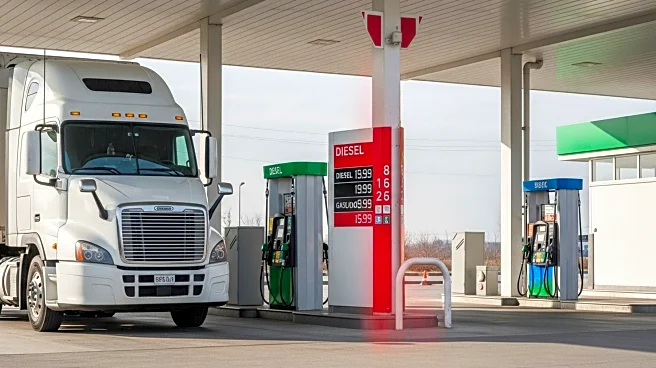What is the story about?
What's Happening?
The trucking and logistics industry is experiencing a notable shift in fuel prices, with diesel prices continuing to fall while gasoline prices are on the rise across various U.S. regions. According to AAA, the national average for gasoline has increased to $3.186, which is 4 cents higher than the Energy Information Administration's current estimate. Despite this increase, the price remains 16 cents lower than the same period last year. AAA's recent press release highlighted that the national average for a gallon of regular gasoline fell by three cents to $3.13, marking the lowest price for this day in five years. The industry is closely monitoring crude oil prices and potential geopolitical events or tropical storms that could impact fuel costs.
Why It's Important?
The fluctuation in fuel prices is significant for the trucking and logistics industry, which relies heavily on diesel for transportation. Lower diesel prices can lead to reduced operational costs for trucking companies, potentially increasing profitability and allowing for more competitive pricing. Conversely, rising gasoline prices may affect consumer behavior and the cost of goods transported by trucks. The industry must navigate these changes while maintaining efficiency and cost control. The broader economic implications include potential shifts in consumer spending and transportation costs, impacting various sectors reliant on trucking services.
What's Next?
The trucking industry will continue to monitor fuel price trends and adjust strategies accordingly. Companies may focus on improving fuel economy through driver training and aerodynamic upgrades to mitigate rising gasoline costs. Additionally, stakeholders will watch for any geopolitical events or natural disasters that could further influence fuel prices. The industry may also explore alternative fuel options to reduce dependency on traditional diesel and gasoline.
Beyond the Headlines
The ongoing changes in fuel prices may prompt a reevaluation of energy policies and investments in renewable energy sources within the transportation sector. As the industry adapts to these shifts, there could be increased interest in electric and hybrid vehicles, potentially leading to long-term changes in fleet composition and infrastructure development.















